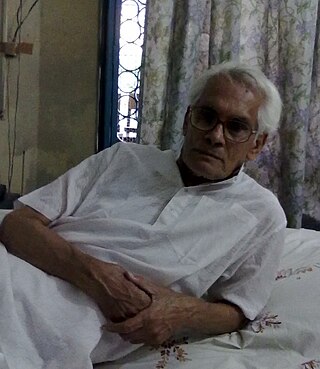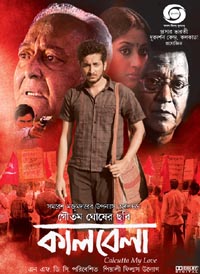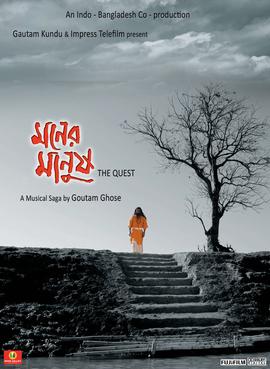Related Research Articles

Prosenjit Chatterjee is an Indian actor and producer. He is widely regarded as one of the leading actors of modern Bengali cinema. He predominantly works in Bengali cinema. He is the son of veteran Bollywood actor Biswajit Chatterjee.

Roopa Ganguly is an Indian actress, playback singer and politician. She is best known for her portrayal of Draupadi in B R Chopra's hit television series Mahabharat. Often promoted as the Tollywood's answer to Bollywood's Shabana Azmi, she is known for her versatility and accent adaptation. She has worked with directors such as Mrinal Sen, Aparna Sen, Goutam Ghose and Rituparno Ghosh. She is a trained Rabindra Sangeet vocalist and a classical dancer. She received several awards including a National Award and two BFJA Awards. In October 2016, she was nominated as a Member of Parliament, Rajya Sabha, by the President of India. She served as the President of BJP Mahila Morcha in West Bengal. She served as the General Secretary and the Vice-President for the West Bengal Motion Picture Artistes' Forum, a body representing cine artistes. Her films have commulatively grossed more than US$100 million worldwide.
Paar is a 1984 Indian Hindi-language film directed by Goutam Ghose and produced by Swapan Sarkar. The film stars Shabana Azmi, Naseeruddin Shah and Om Puri. Naseeruddin Shah won a Volpi Cup for his role as Naurangia. The film was based on Bengali story Paari by Samaresh Basu.

Nandan is a government-sponsored film and cultural centre in Kolkata, India. The primary aim of the cultural hub is to encourage and facilitate cinematic awareness in society. It includes a few comparatively large screens housed in an impressively architectured building. The complex, besides being a modern cinema and cultural complex, is a popular destination for the young and the aged alike.

Samir Roychowdhury, one of the founding fathers of the Hungry Generation, was born at Panihati, West Bengal, in a family of artists, sculptors, photographers, and musicians. His grandfather Lakshminarayan, doyen of the Sabarna Roy Choudhury clan of Uttarpara, had learned drawing and bromide-paper photography from John Lockwood Kipling, father of Rudyard Kipling, who was Curator at the Lahore Museum, and thereafter established the first mobile photography-cum-painting company in India in the mid-1880s. The company was later taken over by Samir's father Ranjit (1909–1991). Samir's mother Amita (1916–1982) was from a progressive family of 19th-century Bengal renaissance.

Kaalbela is a 2009 Bengali film directed by Goutam Ghose. The film stars Parambrata Chatterjee, Paoli Dam, Soumitra Chatterjee and Santu Mukherjee. This film is set against the background of the Naxalite movement. Based on a 1980s novel by Samaresh Majumdar, the film sets itself up, quite self-consciously, within a certain tradition of films, namely radical political Bengali cinema of the 1970s and 1980s. It thus establishes an intertextuality and a certain connection with them. By situating itself and the story it has to tell, within this matrix of the 1970s radical Bengali cinema, Ghose anchors the film squarely within that time. The mood and the events certainly, but even the way black and white shots are used, underlines a somewhat documentary – and thus temporally limited – way these sequences are put to use.Mixed Response at Indian Box office.

Padma Nadir Majhi is an Indo-Bangladesh joint production feature drama film directed by Goutom Ghosh from the novel of the same name, Manik Bandopadhyay's Padma Nadir Majhi, shows life of fishermen of the Padma River.

Moner Manush is a 2010 India-Bangladesh joint venture Bengali-language biographical musical drama film based on the life and philosophy of Lalon, a noted spiritual leader, poet and folk singer of Bengal in the 19th century. Directed by Goutam Ghose, who also wrote the screenplay, the film has Prosenjit as the lead actor portraying the character of Lalan Fakir. Paoli Dam plays the character of Komli, the key female disciple of Lalan. Moner Manush has been critically and commercially successful.

Goutam Deb is an Indian Politician currently serving as the Mayor of Siliguri Municipal Corporation. He was a Cabinet Minister of Department of Tourism in the Government of West Bengal from 2016 to 2021. He also served as the Minister of North Bengal Development, a newly formed department in 2011 by Mamata Banerjee, the first woman Chief Minister of West Bengal. He was a Member of Legislative Assembly from Dabgram-Phulbari Assembly Constituency two times. Presently he is serving as Mayor of Siliguri Municipal Corporation and Observer of Jalpaiguri District Trinamool Congress Committee.

Nusrat Jahan Ruhi is an Indian actress and politician who predominantly works in Bengali cinema. Beside the acting career, from 2019 to 2024, Jahan has represented as the Member of Parliament, Lok Sabha from Basirhat constituency as a Trinamool Congress candidate. Jahan's screen debut was in Raj Chakraborty's Shotru.
Banga Bibhushan Samman is a title instituted by the West Bengal government to honour the services of personalities in various fields. The Banga Ratna Samman and the Banga Bhushan Samman awards are also granted.

Baishey Srabon is a 2011 Indian Bengali neo-noir psychological thriller film directed by Srijit Mukherji. It is the first installment of the Srijit Mukherji Cop Universe. It was his second film. The cast consists of Prosenjit Chatterjee, Parambrata Chatterjee, Raima Sen, Abir Chatterjee and director Gautam Ghose, making a comeback after a 29-year absence.

Ekla Akash is a 2012 Indian Bengali film directed by Sandipan Roy. The lead characters of this film are Goutam Ghose, Parno Mittra and Parambrata Chatterjee.

Jaani Dyakha Hawbe is a 2011 Bengali film directed by Birsa Dasgupta and produced under the banner of Cine Nine. The film features actors Parambrata Chatterjee and Payel Sarkar in the lead roles. The musical score was composed by Indradeep Dasgupta.
Dakhal is a 1981 Indian Bengali film directed by Gautam Ghose, with Mamata Shankar, Robin Sen Gupta, Sunil Mukherjee and Sujal Roy Chowdhury in lead roles. The film is about a woman belonging to a nomadic tribe from Andhra Pradesh, known as crow hunters, who elopes and moves to south Bengal and makes a living by occult practices. It deals with the issue of exploitation of tribal people by a deceitful landlord. The film was based on Amma, a short story of Sushil Jana.

Chotushkone is an Indian Bengali thriller film directed by Srijit Mukherji, starring Aparna Sen, Goutam Ghose, Chiranjeet Chakraborty, Parambrata Chatterjee and Payel Sarkar. The film received positive reviews from critics. Srijit Mukherji won the National Film Award for Best Direction at India's 62nd National Film Awards.
Arka Sinha/Orko Sinha is an Indian film maker, actor, writer, lyricist, singer, composer, producer and a former computer science engineer from the movie industry of West Bengal, Kolkata. He marked his debut with Aamar Aami in December 2013. The script-screenplay-lyrics-dialogues and direction of the film were all by Orko.
References
- ↑ Stefano Reggiani. "Ecco i film che a Venezia si contendono i Leoni d'oro". La Stampa (183). 28 July 1982.
- ↑ "Buddha had forced me to make my acting debut in his 'Grihajuddha': Goutam Ghose | Kolkata News - Times of India".
- ↑ "Buddha had forced me to make my acting debut in his 'Grihajuddha': Goutam Ghose | Kolkata News - Times of India".